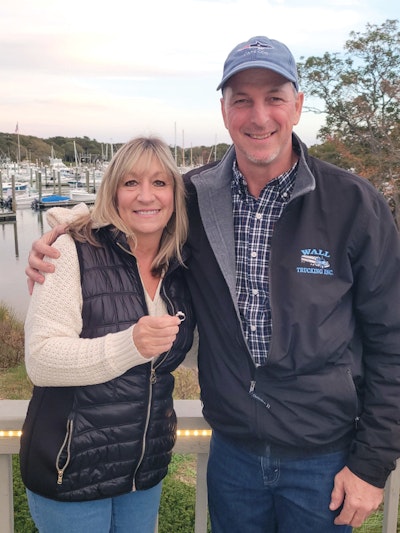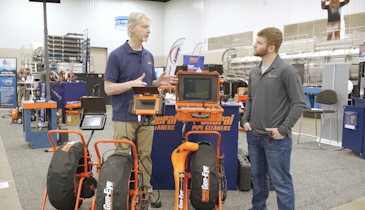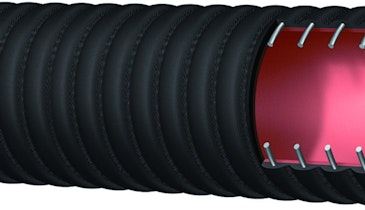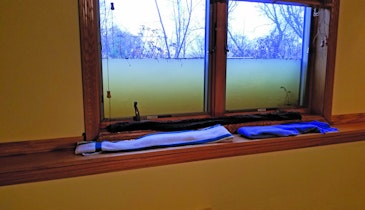
Jeff Wall is shown with his two Mack septic service trucks. The red one is a 2000 model with a tank from Presvac Systems and a Fruitland pump, recently refurbished by Andert. The Blue is a 1993 model carrying a new tank from Tank Services.
Pumpers are too often the bearers of bad news to homeowners — “I’m sorry but your drainfield is failing,” or “Once your tank was empty, I found structural issues and you’ll need a new tank.” So it’s great when the pumper gets to the end of the job and can share some good news with the customer.
Such was the case for Jeff Wall, of Wall Septic and Rooter in Harwich, Massachusetts, a few months ago when he pumped down and rinsed out a tank for a customer in Yarmouthport in Cape Cod.
“It was late on Saturday afternoon and I was taking my time — I typically thoroughly rinse out tanks with a water hose — and the next thing you know there was a sparkle there,” Wall explained. “It looks like a diamond ring. Once you put a flashlight on a diamond, it flashes back huge. I got my scoop shovel out and got it.”
Wall turned off the pump, summoned his customer, Brian Snow, and asked him to bring his wife outside for a big surprise.
“She came out and I showed her the ring. She got all emotional and couldn’t believe it,” Wall recalled. But at this point, Wall only had half of the story. He didn’t know the trials that the Brian and Annette LaRocca Snow had endured over this ring … and two others flushed down the toilet two years previous.
MAJOR MISHAP
It all started one afternoon in 2019 when Brian Snow found wadded pieces of toilet paper on the bathroom sink. He promptly flushed them down the toilet. Hearing the second flush, Annette ran into the bathroom to stop Brian, but it was too late. Annette had left three rings — her gold wedding band, a gold engagement ring with clusters of diamonds, and a gold ruby ring — drying on the toilet paper after she’d washed them.
Frantic, Brian ran to the basement and cut into the pipe leaving from the toilet and held a bucket under the pipe while the toilet was flushed again. Plop, the wedding band landed in the bucket, but the other rings were nowhere to be found, presumably already in the septic tank inlet pipe or the tank itself.
At that time, the Brian called several local pumpers looking for someone who would empty and search his tank with care to find the other rings. Besides the obvious sentimental value of the engagement ring in particular, that ring had a replacement value of $10,000, he explained. Jeff was among the pumpers he called, but he was too busy to take on new customers and he declined the job. Jeff had no memory of this when he was recently called out to provide routine pumping maintenance at the Snows’ home.
The pumper who agreed to come the first time did a very rushed job, recalled Brian, who figured the rings were gone forever. However, then the upset homeowner did the unthinkable — he decided to go into the tank and search for the rings by running his gloved hands through the leftover sludge.
Any pumper would cringe at the thought of a customer entering a tank. We all know the extreme danger involved in entering a septic tank without the proper safety equipment and confined-space entry training. Snow didn’t seem to understand just how dangerous this was. He explained that he works in the pesticide industry so he put on a respirator, dropped a ladder in the tank and entered. Feeling around with his hands, he didn’t turn up either ring, so he closed the tank and gave up.
This is the point where I’m wondering if any of you have had DIY customers enter their tanks under similar circumstances. I found this story shocking and I told Brian how fortunate he was not to have been overcome by hydrogen sulfide gas. He entered the tank with no safety equipment and nobody spotting him outside the tank. I admonished him never to attempt something like this again just like I hope all of you would warn your customers never to go into their tanks.
IT PAYS TO BE THOROUGH
Fast forward two years and Brian called Jeff because he wasn’t happy with the last service provider. Jeff had no recollection of talking to the homeowner earlier or the story about the missing rings. He just showed up and got to work. From the condition of the tank, his observation was that the previous pumper hadn’t made a serious attempt to find the ring.
“Knowing there was a ring in there, I don’t think he helped (Snow) out too well. It would have been difficult (to find the rings) because the sludge was so heavy,” Jeff said. He didn’t want to say anything bad about another pumper, but stressed a careful job is necessary for a chance to locate valuables in a tank.
“Every time I go on a job, I pump the top layer, skim down at the bottom, connect the water hose to the house and rinse the tank down. Nothing beats a rinse after you’re done,” he said. “I carry 150 feet of water hose on the truck at all times. I just tell people what you get with me is a thorough job and the inlet cleaned and the outlet visually checked with a light and a mirror to make sure it’s intact.”
Jeff typically uses a long-handled spoon or a shovel to break up the scum layer and skim it to the suction hose. Too often he’s opened tanks where he’s seen other pumpers who have worked the hose through the scum layer, pumped down the contents and left the scum slumped to the bottom of the tank, with a telltale sign of a 4-inch hole where the hose penetrated the crust.
“I think some other companies really don’t believe in rinsing out the tank. They just want to get to as many jobs as they can in a day. I call it the ‘hit and run,’ and in Cape Cod there’s a lot of that going on,” Jeff said.
SEARCHING FOR VALUABLES
Wall would have a strategy if he got another call to find a valuable ring in a septic tank. He would pump from the outlet end of the tank, far from the inlet where the ring would have plopped into the water and quickly descended into the sludge. He would skim from the top down and rinse the tank as he did to find the Snows’ ring.
“The chances of rings going from the inlet end to the outlet end would be slim,” he said, ensuring that the ring wouldn’t be sucked into the vacuum tank and lost forever.
Over the years, Jeff has found a couple of rings, albeit none with the value of the diamond ring. He still has one where he couldn’t track down the owner from a rental property sitting on his shelf at the shop.
Wall Septic and Rooter dates to 1943 when it was founded by Jeff’s father, Russell A. Wall. Today Jeff, 58, is the only one on a truck, but he has help at the office and hopes to add another driver soon. He runs a 2000 Mack with a 4,200-gallon steel Presvac tank and Fruitland pump. The rig was refurbished by Andert Inc. He also has a 1993 Mack that recently received a new 4,200-gallon steel tank from Tank Services. Other important tools are two Crust Buster tank agitators Jeff utilizes when cleaning restaurant grease traps.
FINDER’S FEE
Finding the ring was a momentous occasion and emotional for Annette, Brian said.
“She just basically broke into tears and bypassed me and ran over and gave (Jeff) a hug,” Brian recalled. “She said she knew all along that it was still in there.”
As a gesture of thanks, the Snows and Annette’s brother, Pete LaRocca, an old friend of Jeff’s, took their new favorite pumper out for a prime rib dinner.
“It was extraordinary that it was still there, and (Annette) said if we found the other one in a couple of years, that would be hilarious,” Brian said. “I’m not counting on it, but you never know.”






